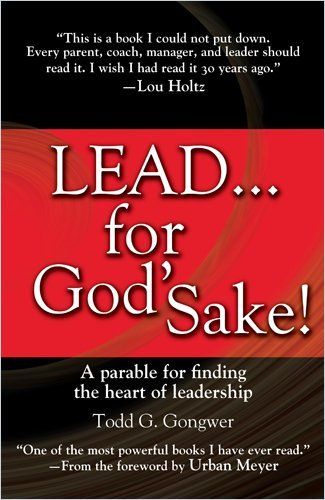Todd G. Gongwer offers an accessible sports parable to help you become a compassionate servant leader.

Embrace Compassion
Todd G. Gongwer, founder of Kardia Transformation Group LLC, dispenses leadership advice through a familiar parable about a high school basketball coach, a CEO and a school janitor embracing servant leadership. Gongwer’s religious theme, which emphasizes finding your life’s true purpose, brings spirituality to his discussion of servant leadership, though it may not appeal to all readers.
An Embattled Coach
After Coach Steve Rocker’s Franklin North High School basketball team lost its third consecutive game, the frustrated coach ranted at his players, berating them for their lack of team leadership.
As far as [Rocker] was concerned, this was all about team leadership, or a lack thereof. There was absolutely no other excuse.Todd G. Gongwer
Joe Taylor, the school janitor, advised Rocker to be patient with the kids. Although he was frustrated with his team, Rocker listened; Joe’s ideas often proved prescient and useful.
Reward and Punishment Leadership
Grant Steffin, Rocker’s neighbor, invited him over for a beer. Steffin, a successful CEO, knew a lot about leadership, Rocker thought. When he complained about his team’s leadership deficit, Steffin advocated traditional reward-and-punishment leadership. He explained that he pays his employees well but comes down hard on underachievers. Steffin believed tough-minded, constant supervision was the only approach that worked.
The only way for me to be sure that people are doing what they’re supposed to be doing is to stay on top of ’em…They have to know if they screw up, there’ll be hell to pay.Todd G. Gongwer
However, Rocker was surprised when Steffin said his wife and children had moved out. Steffin complained that he gave his family a luxurious lifestyle, but his wife had told him she could no longer tolerate his long hours and lack of involvement with their kids. Rocker’s wife Kathy often voiced similar complaints. Both men agreed that success requires sacrifice that their wives didn’t understand.
Unexpected Sources
Rocker put his team through the wringer on Saturday and scolded his senior starters in the locker room. “Lead, for God’s sake, will ya!’’ he hollered. As the boys left dejected, Rocker started questioning his own competence. Maybe his coaching skills were deteriorating. As he sat in his office worrying, Joe Taylor knocked on the door.
Taylor said he stopped by to offer encouragement. He urged Rocker to stay patient and focused, to help his players remember why they play and to remind them of the beautiful heart of the game.
When you choose what’s best for others first, you’re choosing to be selfless.Todd G. Gongwer
Rocker told Taylor about the players’ lack of leadership and team spirit. “Ah…selfishness and leadership,” Taylor said, “two of my favorite subjects.”Being selfless makes the difference among leaders, Taylor told Rocker. He believed that those who can transcend a selfish viewpoint and a selfish culture lead richer, more fulfilled lives and become the most effective leaders.
After the Knights lost their next game at the buzzer, star senior player David Kelton slammed his fist into a locker, breaking three bones in his hand and effectively ending his season.
Compassion, Empathy and Patience
Rocker pulled into the school parking lot as usual at five in the morning and saw the lights already on in Taylor’s office. Rocker decided to drop into Joe’s space for the first time. He was astonished to see that the room was filled with hundreds of books on business, leadership and sports, with some literary classics on hand. Rocker saw photos of the janitor posing with happy, waving students and the warm personal notes students had written to him.
Taylor invited Rocker to sit and talk. Rocker told him he suspected his players had grown so accustomed to winning during their last season that they lacked the willpower to stand up to unexpected adversity.
Later that day, player Brant Stevens told the coach he was leaving the team. His parents’ marital troubles and his academic issues meant he did not have the time, emotional commitment or concentration for basketball. Rocker called Stevens a “quitter,” and Stevens left the coach’s office with tears running down his face.
Taylor suggested that Rocker might need to lead with more empathy, compassion, and patience – the principles Jesus Christ followed. Taylor was confident the team’s situation would improve if Rocker and his players could each define their individual purpose and rediscover their mutual love of the game and the team.
A Change of Heart
Taylor’s words penetrated Rocker’s core. He apologized to Brant Stevens for his failure to show concern for the boy’s challenges. As a result, Stevens rejoined the squad. Rocker confessed to the team that he regretted his tirades and realized he’d set a poor example of leadership.
Unless we build our lives on the right foundation, we’ll never, I repeat, never, realize what it means to be the best we can be.Todd G. Gongwer
The Knights won the district tournament, but Joe Taylor missed the victory celebration. Feeling unwell, he had checked into a hospital. Then the Knights won their next game to qualify for state finals. But that night, Kathy told Rocker that Joe Taylor had died. Rocker’s heart fell as he hugged his wife.
A Lasting Legacy
Executive Carl T. Hadington, the head of a big, successful cleaning company, spoke at Joe Taylor’s funeral in the school’s packed gymnasium.
He told a story about a young man named Tommy. Years ago, he recounted, Tommy often stopped by Hadington’s father’s manufacturing company, seeking the latest tools and equipment for his new cleaning business.
Several years later, Hadington dropped by Tommy’s office. Tommy’s cleaning business was successful, but his wife kicked him out of the house because of his lack of attention to his family.
Hadington then explained that doctors had diagnosed Tommy with a rare disease and told him he had only months to live. With that diagnosis, Tommy embarked on an introspective journey that transformed him into a caring, grateful human being. He reconciled with his wife and decided to quit working.
[Tommy] was starting to see people differently, starting to see them for who they really were instead of seeing simply what they could do for him.Todd G. Gongwer
Tommy asked Hadington to become a partner in his cleaning business. He explained that he was actually leaving the company to start a new life with his family. Hadington became head of the company and agreed never to reveal Tommy’s identity as its founder. The company grew into the world’s largest commercial cleaning company.
Then Hadington announced why he’d come to the school’s memorial service: to honor his company’s founder, Mr. Thomas Joseph Taylor – the man everyone at school knew only as Joe, the janitor.
Familiar Themes
Gongwer gently treads a familiar path, merging Christian thought with athletic striving to encourage readers to embrace both servant leadership and his spiritual approach. Gongwer believes one naturally fuels the other. His proselytizing for compassion and empathy echoes many current leadership guides and his sincerity adds to the power of his tale. Your acceptance of Gongwer’s lessons and his straightforward parable may depend on your receptivity to his religious views, though servant leadership has become an increasingly important factor in discussing how to lead.
Other books on servant leadership include Servant Leadership: A Journey into the Nature of Legitimate Power and Greatness by Robert K. Greenleaf; Servant Leadership in Action: How You Can Achieve Great Relationships and Results by Ken Blanchard and Renee Broadwell; and Servant Leadership for Non-Managers: An Essential Handbook for Anyone Aspiring To Be a Leader by Kenneth Hunter.













